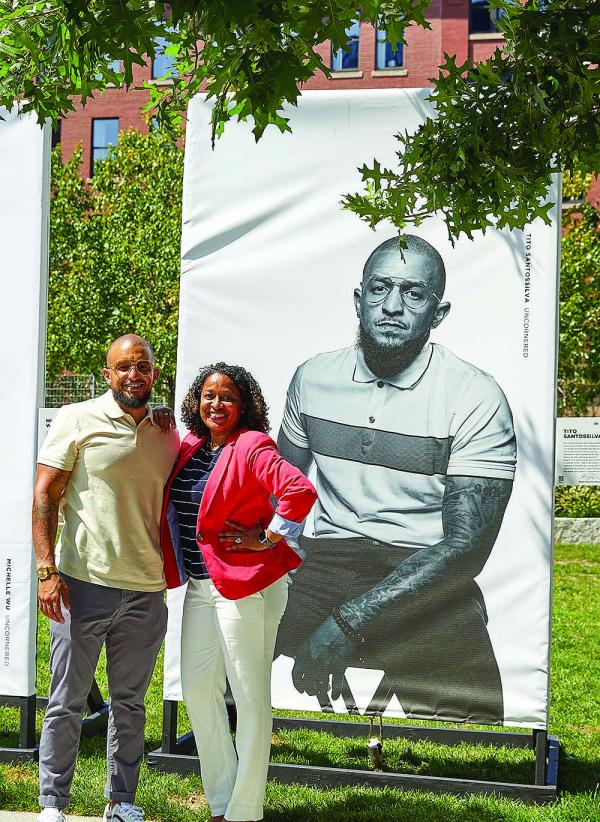September 9, 2021

Tito SantosSilva with Boston Uncornered Co-founder Michelle Caldeira next to Tito’s portrait at the Boston Uncornered Photo Project, which will be at Sea Green Park in the Boston Seaport until September 15. Photo courtesy of Boston Seaport
by WS Development, John Huet photo
Boston Uncornered, a Dorchester-based nonprofit organization that works to reduce gang violence and connect at-risk youth with opportunities, has named Francisco “Tito” SantosSilva as its new executive director.
He comes to Uncornered after having spent over a decade working with underserved and gang-involved youth at UTEC, the Massachusetts Department of Youth Services (DYS), and Elliot Community Services.
Also joining Boston Uncornered is Jerrell Engermann, the incoming chairman of the board of directors and a native of Mattapan.
Boston Uncornered was founded in 2016 as an offshoot of College Bound Dorchester, run by Dorchester residents Mark Culliton and Michelle Caldeira, who wrote a white paper on the core influencer theory that is central to Uncornered’s mission
It “basically put down our point of view about what holds back under-resourced urban communities and who has the power to transform those communities,” Culliton explained. “The core influencers are highly influential and disruptive individuals who live in these communities and are responsible for 50 percent to 75 percent of the violent crime. From that idea, Michelle and I created a program, Boston Uncornered.”
In the ensuing years, Culliton said, “we’ve transitioned out of all other programming, and now only do Uncornered, which engages and leverages the power of active and former gang members to move from the corner to college and to transform their community and create opportunities for all.”
Hiring SantosSilva, Culliton hopes, will allow the nonprofit to build capacity in Boston and then “leverage our insights that we’ve developed in Dorchester and Boston to impact the country and create the day when we have a gang-violence-free America as a way to realize the full potential of urban communities.”
Boston Uncornered boasts an impressive track record from its first five years. Through neighborhood-based mentorship, educational support and college counseling— and direct stipends to students— the program has been able to support 70 percent of its students to college matriculation, approximately double the national average for gang-involved youth.
A study conducted by Bain & Company in 2020 found that between 2016 and 2018, neighborhoods with heavy engagement with Uncornered showed impressive drops in violence. Many of the core influencers identified by Boston Uncornered have since stepped into leadership roles as College Readiness Advisors (CRAs).
On the heels of these successes, Culliton and Caldeira hope to pass the reins of the Boston program to SantosSilva while exploring opportunities to engage with national efforts to reduce and end gang violence.
“I’m a first-generation Cape Verdean American, and the population that we work with is very directly connected to my story,” SantosSilva told the Reporter. “I’ve watched young people in my community—family members, friends, even, fall into some of the struggles that the young people we work with face. That’s why I do the work. Before I started at Uncornered, I was very familiar with their work. When the opportunity arose to dive deeper into a community that reflects where I grew up, I jumped at it.”
As executive director, SantosSilva hopes to emphasize the positive potential of core influencers both in Uncornered and beyond.
“A lot of the time, young people in Boston [are in this situation] due to a lack of resources, a lack of community opportunity. As a society, we tend to jump quickly to assigning morality to the behavior and not looking at where students are and what limitations they may be facing. I hope to highlight the value that the core influencers bring to the table.”
In addition to working toward common objectives with the state of Massachusetts, providing greater financial support to students, and continuing to connect core influencers with opportunity, SantosSilva hopes to encourage professional development among Boston Uncornered’s current staff and students.
“I think representation matters. When someone who looks like you, talks like you, comes from the community you come from, likes the things that you like, grows [professionally], I think that that has an impact as well,” he said. “It’s like a secondary support system in believing that there are opportunities available to you by seeing people who look like you succeed.”
For his part, Culliton looks forward to expanding the mission of Uncornered in and beyond Boston.
“I just don’t believe that gang members are bad people,” he said. “They sometimes make horrific choices with huge consequences, but it’s not because they’re fundamentally evil. If given opportunities, they realize those the same way any of us do. But because of their unique networks, their transformation is so much more powerful than the typical kid in the typical school or program.”
“The core of Uncornered is that those who are closest to the problem have the best solutions. In bringing Tito on, with his background and his much more personal connections to the impact of gang violence, it’s closer to the ideal that core influencers are the solution. We can go out and provide funding and support, and translate to downtown that these are beautiful, positive people, but the essence is that core influencers can and should be leading this transformation.”




